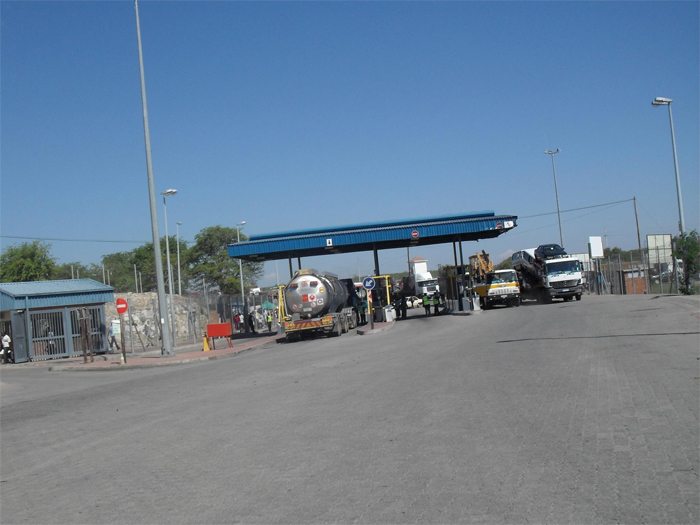BEITRBRIDGE – Truck drivers have spent up to 10 days at the Beitbridge border post due to a “culmination of various events” as company Zimborders — awarded a contract to upgrade the border post — began collecting toll fees.
Zimborders expects to collect more than US$1billion over 17 years from toll fees before it hands over the upgraded border facility to the Zimbabwean government through a “build, operate and transfer” deal.
With the first phase of the $300 million upgrade, a freight terminal and the new immigration building opened, it has been a torrid month for truckers.
A notice shared with truckers and clearing agents by Zimborders said toll fees were for now accepted only in cash and card payments would be allowed only at the end of October.
“Please make sure your drivers have enough cash to pay the toll fee. Credit cards and prepaid vouchers will NOT be available,” read the notice.
Adding to the logistical nightmare, payments can be made only at the Zimborders counter in the terminal building, where:
heavy vehicles such as trucks and buses pay US$115 for passage;
goods vehicles such as rigid containers and trucks pay US$201; and
abnormal load vehicles carrying machinery are charged US$344
The charges factor in VAT of 14.5%. With an average 1,000 trucks passing through Beitbridge daily, each paying US$201, that translates to US$73 million annually — or US$1.24 billion over 17 years.
The fees are for border use in both directions, north and south.
In addition to toll fees, vehicles pay US$23 to access the New Limpopo Bridge into Zimbabwe.
That money is collected by the Zimbabwe National Road Authority (Zinara).
The new fees exceed the previous US$100) toll fee and US$9 road access flat fees paid by all vehicles in the past.
Trucks registered in Zimbabwe are allowed to pay in local currency or US dollars, while foreign vehicles pay US dollars.
“It’s hell, I tell you. One of us [truckers] was even robbed in the queue last week.
“We have nowhere to bathe, no toilets. Can you imagine 10 days in a queue stretching more than 10km?” said truck driver Simbisai Nyoni.
There are also fears that the situation could aggravate the Covid-19 situation in South Africa and Zimbabwe.
Zimborders CEO Francois Diedrechsen said in an e-mailed response to TimesLIVE that things were improving.
“At its worst, the queues northbound last Tuesday were at 10km and three lanes wide, with slow flow though at the border.
“This has now improved to mostly single-lane [small parts are still double-lane] queues of less than 8km and declining by the day,” he said.
He said things got bad because the border was opened to general traffic, leading to high volumes, but curfew working hours were still in place.
Road Freight Association CEO Gavin said on Wednesday that truck queues on the Zimbabwean side had been dealt with.
But South African Home Affairs minister Aaron Motsoaledi said the Zimbabwean government was not playing ball.
“The situation already changed in the past 24 hours. The queues from Zimbabwe are gone,” said Kelly. “We are trying to eradicate the SA-side queue today.”
DA MP and party spokesperson on home affairs Angel Khanyile on Monday urged Motsoaledi “to engage with his Zimbabwean counterpart as a matter of urgency”.
Khanyile alluded to reports that “growing numbers of trucks have been stuck at the Beitbridge border post for more than five days before being processed into both countries”.
“The renovations at SA’s border with Zimbabwe have caused queues …
“Truck drivers are stranded without water or ablution and sanitation facilities. This poses a risk to their health with both countries still in the midst of the Covid-19 pandemic.”
Khanyile said similar delays had claimed a truck driver’s life last year.
“Not only was the supply chain severely compromised when trucks were forced to endure days-long queues at Beitbridge in the past, but one driver died in 2020 in similar circumstances. This cannot happen again.
“The South African and Zimbabwean economies are both dependent on truck drivers and they cannot be put in harm’s way because of a failure to plan contingencies during the renovations at the border.”
Contacted on Wednesday, Motsoaledi said Khanyile was “politicking”.
“Khanyile is just [using this as a] political gimmick, as politicians always do. This is election time, after all,” said Motsoaledi.
“Yesterday I explained that Zimbabweans are not budging, but it does not mean there is no intervention.
“We have been intervening for the past two weeks. I have been sending messages to their minister and I think we will [escalate it] to a higher level. But we are intervening.”
He said Zimbabwe’s decision to “charge people US$200 and demanding the money in cash” had complicated matters.
“And when you are doing renovations you make no space for parking, when you know that Beitbridge is not only a passage to Zimbabwe, it’s a passage to the whole continent,” said Motsoaledi.
“We have been discussing the issue about automation forever.
“The newly renovated buildings have opened 75% of the place, which is new.
“But that newly renovated place is not automated.
“So it doesn’t matter how many trucks you process in SA, they can only take a particular number.
“At some stage they could only take 10 trucks per hour. That is quite terrible for us.
“We have a team based there permanently, which is meeting [Zimbabwean] officials every single day.
“And every time they meet, they say, ‘We are waiting for an answer from Harare.’” –TimesLive

 Slider3 years ago
Slider3 years ago
 National4 years ago
National4 years ago
 Tourism and Environment4 years ago
Tourism and Environment4 years ago
 Special reports4 years ago
Special reports4 years ago
 Opinion4 years ago
Opinion4 years ago
 National4 years ago
National4 years ago
 National3 years ago
National3 years ago
 National3 years ago
National3 years ago



